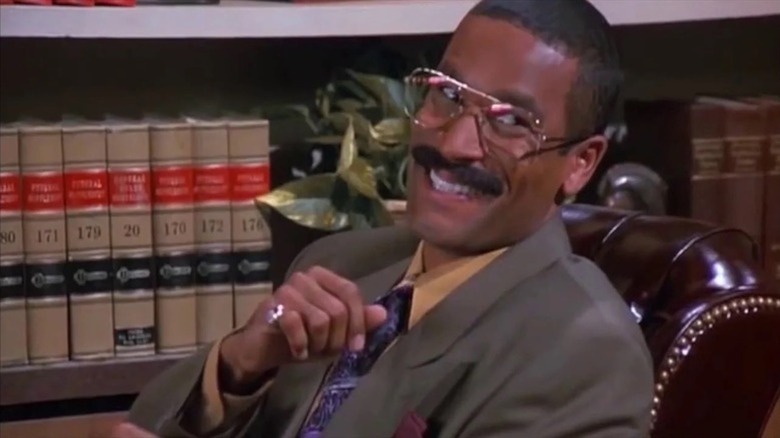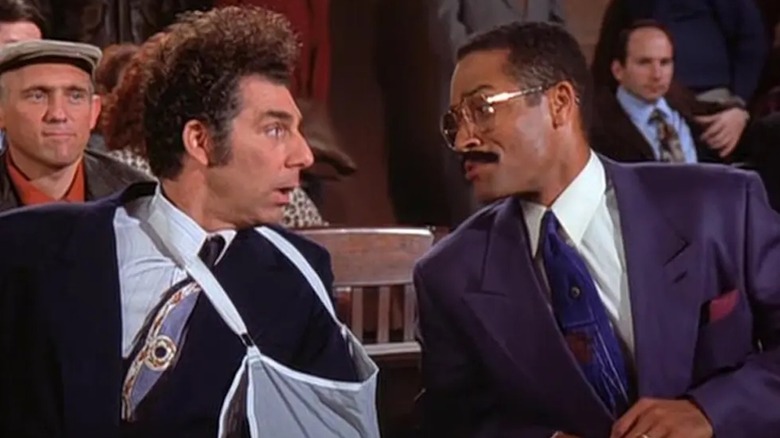Jackie Chiles' Actor Got A Warning From Jerry Seinfeld On His First Day Of Filming
The term "trial of the century" has been used to describe such juicy court cases as the kidnapping of the Lindburgh baby, the Tate-LaBianca murders carried out by Charles Manson and his followers, and the Los Angeles Department's use of excessive force in the arrest of Rodney King. But in my lifetime, I have never seen a more captivating (and depressing) spectacle than NFL Hall of Fame running back and beloved media personality O.J. Simpson being tried for the murder of his wife, Nicole Brown Simpson, and Ron Goldman. Every single second of the proceedings was aired on CNN, and when star witnesses got called in, the major networks preempted their soap operas to captivate their viewership with a sudsy, high-stakes murder-mystery packed with real-life twists and turns.
Most people couldn't buy O.J. Simpson as a murderer. He was a willing, charismatic pitchman for a number of products, and appeared in box office hits like "The Towering Inferno" and "The Naked Gun" movies. He was on HBO's pro-football sitcom "1st & Ten." This guy was a metaphorical ladykiller.
But a month or so into the case, after Simpson turned himself in after that famous low-speed car chase throughout Los Angeles, it became clear to just about everyone with a functioning BS detector that the Heisman Trophy running back was extraordinarily guilty of killing Brown and Goldman. What happened next? If you were around at the time, you can probably state where you were when the decision was handed down. If not, there's a good chance you've seen the phenomenal documentary "O.J. Made in America" or the tawdry Ryan Murphy-produced drama "American Crime Story: The People v. O.J. Simpson." And while you should absolutely blame the overmatched prosecutors for failing to slam shut a case that was winnable from day one, you have to concede that the star of the trial was not Simpson, but the one-time public defender who rose to the occasion and, with remarkable rhetorical flourish, got his client off the hood. This was, of course, Johnnie Cochran, and he was such a flamboyant, quip-happy stereotype of a slick-talking lawyer that a sitcom like "Seinfeld" couldn't help but turn him into a recurring character.
But the actor (Phil Morris) cast as the Cochran parody, Jackie Chiles, almost blew his golden opportunity by getting experimental with his portrayal. Fortunately, Jerry Seinfeld steered him back on course.
Phil Morris foolishly tried to play Jackie Chiles as something more than a Johnnie Cochran parody
Jackie Chiles was, in a way, the role Morris was born to play. He had grown up in Los Angeles and got his haircut at the same barbershop frequented by Cochran; as an aspiring actor, he'd studied the loquacious barrister's demeanor, knowing that there were, if nothing else, affectations he could work into another character. Instead, he landed the dream role of Chiles in the classic episode "The Maestro," who represented Michael Richards's Kramer as he sought legal satisfaction for getting scalded by an unreasonably hot cup of coffee purchased at the fictional Java World.
When Morris came in to read for the part of Chiles, he thought he'd bombed out when Seinfeld halted his audition. As Morris said on the behind-the-scenes documentary for the series' DVD, "I do the first couple of lines, and Jerry says, 'Hold on.'" Seinfeld walked over to the thermostat in the room, turned it up, and informed Morris that he was so funny that he was making him perspire. Morris had the part.
Alas, Morris got a tad overconfident when he arrived for his first day of shooting. Though Seinfeld was not in the scene being shot, he was present for the shoot and was immediately concerned that Morris was altering his portrayal of Chiles. So he told Morris, "No. You spend the entire week doing exactly what you did in the office when we saw you on Saturday. That's your job."
Morris, who had understandably little interest in getting fired from one of the most popular shows on television, retreated to the Chiles he'd played during his audition, and he became a valuable member of the "Seinfeld" company (playing a prominent role in the series finale).

